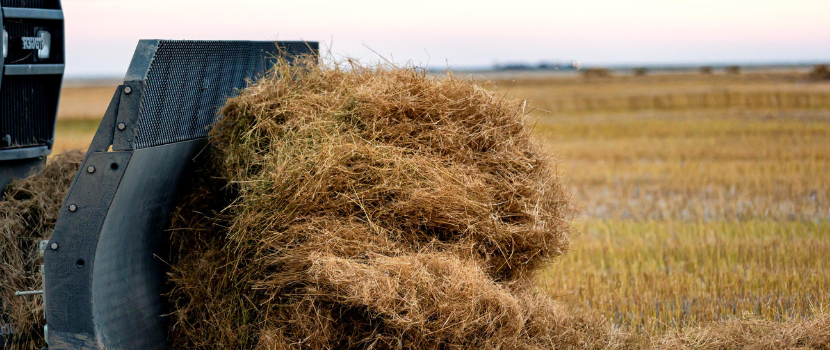Member News: Prairie Clean Energy and Sask Polytech launch prairie biomass initiatives
January 11, 2024
January 9, 2024 – Earlier this year Saskatchewan-based business, Prairie Clean Energy received a $1.1 million grant from the Mining Innovation Commercialization Accelerator (MICA) Network for their innovative greenhouse gas (GHG) emissions reduction project. The project aims to revolutionize the potash industry by utilizing locally produced agricultural waste in the form of flax straw to generate low carbon bioheat, potentially reducing GHG emissions by up to 80 percent.
As part of this project Prairie Clean Energy is partnering with the Sustainability-Led Integrated Centres of Excellence (SLICE) at Saskatchewan Polytechnic. This collaboration includes the establishment of a living lab at Moose Jaw campus, free micro-credentials and the development of an online Geographic Information System (GIS) platform to trace and track the source of biomass used for bioheat generation.
“This project aligns perfectly with SLICE’s focus on the circular economy, which prioritizes sustainability and waste reduction,” says SLICE director Dr. Robin Smith. “Agricultural waste like flax straw would normally be burned in fields. Processing flax straw into low-carbon pellets for biomass boilers exemplifies principles of the circular economy: reusing, recycling, and upcycling of materials and resources to minimize waste and promote sustainability.”
“We are transforming the challenge of managing straw waste for flax growers in Saskatchewan into an alternative low-carbon heat solution for the potash industry. This industry, requiring substantial heat for its operations, currently relies on natural gas as its primary heat source,” says Mark Cooper, the CEO of Prairie Clean Energy. “This project not only demonstrates a great example of cross-sector collaboration between agriculture, energy and mining industries but also supports the potash industry in Saskatchewan to meet their sustainability goals.”
Living lab pilot project
Prairie Clean Energy is working with Sask Polytech to launch a living lab pilot operation at an agriculture field site near Moose Jaw, Sask. This collaboration will serve as a testing ground to highlight the potential of renewable fuel derived from prairie biomass to heat buildings. The living lab pilot will include a demonstration biomass boiler system, which will be purchased and installed in 2024 and used to heat an equipment storage and teaching space for the Agriculture and Food Production program. The primary objective of this initiative is to assist Saskatchewan’s mining sector in adopting biomass (specifically, pelletized flax straw) as a sustainable heating source for large buildings. It aims to provide a demonstration of biomass boiler operation and establish a platform for educational and learning experiences within the industry.
C2R2 micro-credential
In preparation for the clean energy sector’s future, Sask Polytech is offering four new, free micro-credentials in partnership with Quick Train Canada and Canadian Colleges for a Resilient Recovery (C2R2). These micro-credentials focus on biomass production, handling, storage, and supply chain distribution. The training programs aim to upskill and reskill Canadians, supporting the transition to a low-carbon economy. Sask Polytech is a C2R2 member and is focused on offering courses that provide the tools and skills required for workers to succeed as the economy transitions to more sustainable practices.
Online GIS trace and track platform
Prairie Clean Energy is actively striving to establish a regional source of flax straw pellets to support the adoption of modern biomass boilers in the Canadian prairies, including the 250 kW modern biomass boiler at Sask Polytech’s living lab site. To secure the flax straw needed to make pellets to generate energy Sask Polytech is developing an online GIS platform. This GIS map will trace and track the location of flax straw suppliers in Saskatchewan, including their size and biomass yield and identify optimal distribution routes. Additionally, it will help monitor the origin and sustainability of the product supply for investor confidence. The development of this tool is made possible through funding from the Saskatchewan Advantage Innovation Fund with Innovation Saskatchewan.
Flax straw pellets
These projects are possible thanks to Prairie Clean Energy’s pending proprietary and patented flax straw pellets. By utilizing these pellets, made from agricultural waste, from space heating and process heat, the carbon intensity of heat consumption can be significantly reduced. Prairie Clean Energy’s chief product and supply chain development officer, Dr. Mahmood Ebadian shares, “We estimate that by displacing fossil fuels with prairie biomass, we can support the potash industry in lowering greenhouse gas emissions significantly. This project focuses on deep decarbonization using a local renewable energy source and a proven bioheat technology.”
Bryan Sarauer, a program head in Moose Jaw, played a pivotal role in initiating this project. “His innovative idea to heat one of the buildings for the Agriculture and Food Production program has now blossomed into a demonstration site, new training opportunities and a cutting-edge GIS platform. This success story highlights the benefits of applied research at Sask Polytech and the power of collaboration and sharing ideas,” says Smith.
The partnership between Prairie Clean Energy and SLICE at Sask Polytech represents a significant step towards achieving sustainable and environmentally friendly practices within the potash industry. By harnessing the power of prairie biomass, this innovative project has the potential to revolutionize the sector and contribute to a greener future.

Sask Polytech faculty, researchers and students collaborate with the private and public sector on applied research projects. These projects take many forms including product development, process design, technology adoption and proof of concept. Using state-of-the-art facilities, equipment and faculty expertise Sask Polytech delivers solutions and helps industry to capture new opportunities. Intellectual property for all applied research projects is retained by industry, creating more incentive for future creative engagement and ongoing collaboration.
To learn more about applied research at Sask Polytech visit saskpolytech.ca/research.